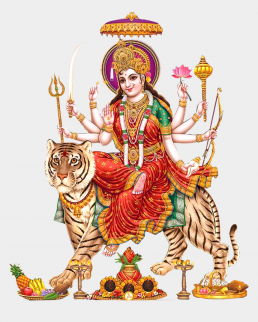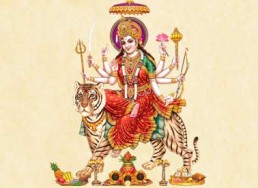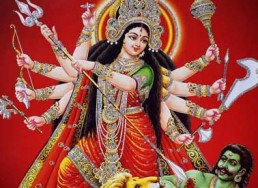Sarva Mangala Mangalye
शरण्ये त्र्यम्बके गौरि नारायणि नमोऽस्तु ते ॥
śaraṇye tryambake gauri nārāyaṇi namo’stu te ..

Description
This verse is a heartfelt invocation to the Goddess, seeking her blessings and protection. It praises her as the source of all auspiciousness, the granter of all desires, and the one who offers refuge. The Goddess is revered in her various forms: Gauri (the fair one), Tryambake (the three-eyed), and Narayani (connected with Vishnu). The prayer is often recited to invite prosperity, well-being, and divine grace, requesting the removal of obstacles and protection in every aspect of life.
Word-by-Word meaning
sarvamaṅgalamāṅgalye: the most auspicious among all that is auspicious
śive: O benevolent one
sarvārthasādhike: one who fulfills all desires and grants all achievements
śaraṇye: O refuge of all beings, the one who offers protection
tryambake: the three-eyed goddess (a reference to Goddess Parvati)
gauri: O fair-complexioned one
nārāyaṇi: consort of Lord Narayana (Vishnu)
namo’stu te: I bow to You
A powerful Durga Devi mantra. It is from Devi Mahatyam which is part of Markandeya Purana. When Goddess killed two demons Sumbha and Nisumbha, Devas eulogized Devi with their hymns. This hymn is part of their eulogy to Divine Mother. This shlokam comprises seven names praising Goddess Durga. Sarva Mangala Mangalye, Shive, Sarvartha Sadhike, Sharanye, Triyambake, Gauri, Narayani We bow to that great Goddess, the Shakti as the giver of all fortunes and our refuge, our saviour.
Commentries on the Devi Mahatyam instruct that this Shlokam can be chanted 7 times daily on a regular basis to attain the blessings of the Goddess.
Note: Although Sarvartha Sadhike literally means to say that She fulfills the desires of all, there is another meaning for Sarvartha – the 4 (arthas) attainments in a human life:
Dharma (Righteousness, Dutiful Living)
Artha (Prosperity, Wealth)
Kama (Desire)
Moksha (Liberation)
Note: There are interpretations of this verse to be dedicated to Goddess Lakshmi as well. In reality those with wisdom do not differentiate between the 3 goddess deities of Lakshmi, Saraswati and Parvati (Durga) and worship all three as the same divine Mother of all.
Other Durga Shlokams
Argala Stotram
The Argala Stotram is a powerful hymn dedicated to Goddess Durga, often recited during the Chandi Path or Durga Saptashati.
Ayigiri Nandini
The Mahishasura Mardini Stotram also known popularly as Aigiri Nandini, holds immense significance during Navratri. The word Mahisha means buffalo and Asura means Rakshasa or Demon. Composed by the great sage Adi Shankaracharya around 810 AD, this…
Devi Aparadha Kshamapana Stotram
Composed by Sri Adi Shankaracharya. Aparadha Kshamapana stotram is usually recited after a recital or after the completion of Puja. Its like asking for forgiveness from Goddess for various mistakes th
Devi Suktam
Devi Suktam or the Vaak Sutam (Vak suktam) occurs in the 10th mandala of Rig Veda Samhita as suktam number 125. The seer of the mantra is vak, the daughter of rishi ambharnaa,
Durga Suktam
This is a prayer to the fire god Agni occurring in the Maha Narayana Upanishad. Section two. Agni, the Lord of Fire, symbolises the power of action.Goddess Durga symbolizes dynamism, energy, diligence
Kalika Ashtakam
Composed by Sri Adi Shankaracharya on devi Kalika. The Goddess Kali is the guardian, also known as Kalika. The protectors, the Mother, Kali is Dharma and eternal time. Kali shines with the brilliance
Keelaka Stotram
Rishi Markandeya tells his disciples in sixteen shlokas the ways and means of removing obstacles faced by devotees while reading Devi Mahatmya. Reading of Keelakam brings blessings of Devi, spiritual
Mahishasura Mardini Storam
Mahishasura Mardini Stotram - This is a prayer to the Goddess who killed Mahishasura. “The place where Sri Mahishasura Mardini Stotram is sung every day, I will always be present and never leave.” - The Devi’s proclamation in the 12th chapter of the…
Shakradaya Stuti
This famous stuti is sung by Shakra (Indra) and the other devas in praise of Durga. This is part of Chandi path which is a text about Goddess Chandi. It is also called Durga Saptashati or 700 verses r
Tantrokta Ratri Suktam
Ratri Sukta is one of the famous hymn to Goddess Durga. This in true essence praises the latent energy in Narayana and in every sadhak. Ratri Suktam is used to invoke that energy and to enhance the mi
Sarva Mangala Mangalye – Durga – Sarva Mangala Mangalye – In Sanskrit, English with Audio, Meaning, Significance


